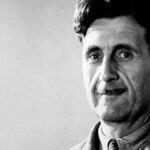
“The universal end-state society, Kojève argued, was the society in which any individual could attain what he desired with ease and without opposition…”
With the deafening thunder of Napoleon’s canons filling the air at Jena, the romantic story goes that a middle-aged university professor and philosopher by the name of Georg W.F. Hegel was riding away busily making revisions to his explosive philosophical work, Phenomenology of Spirit. In the aftermath of the thunder and lightning that struck across the Sale River on that October morning, the conventional (but ultimately apocryphal) story goes that Hegel declared “the end of history.” Liberté, égalité, and fraternité—irrespective of how it was particularly manifested—was the movement of all history and human desire.
Alexandre Kojève is arguably the most consequential modern interpreter of Hegel. There is no reason to enter the petty bickering over his analysis of Hegel and how much of it is Kojève’s projection onto Hegel contra Kojève’s analysis of Hegel qua Hegel. Instead, Kojève’s brilliance lies in his use of Hegel to offer his own end of history: the universal homogenous end-state of mass consumerism and happiness.
The universal end-state society, Kojève argued, was the society in which any individual could attain what he desired with ease and without opposition: an equality of consumption and the happiness it brings for all persons. Until we have equal outcomes in our consumeristic desires, we cannot have the mutual recognition we all seek. Freedom is to be free from all barriers and constraints to our consumeristic desires—the barriers and constraints of supposedly arbitrary cultural and social distinctions, and, especially, the barrier imposed onto humans by nature. Kojève, in this respect, is very much the Enlightenment philosopher par excellence in the tradition of Bacon, Hobbes, and Descartes, where the task of philosophy should not be to discover the truths of nature to help man imitate nature (as in the classical paradigm of Plato, Aristotle, and the Stoics, which was subsequently theologized by Christianity) but, rathre, to help man master nature and improve the quality of his material life in this world.
In this move, we can begin to understand why technology, especially modern technology (and technology monopolies throughout the United States and broader world), is so fervently liberal in the French Revolutionary tradition: The power of technology is the key spirit for humanity’s homogenization into the common pot of liberté, égalité, and fraternité. Technology liberates us from the barrier of natural hardship, which prevents our choosing to be what we desire. Technology also aids in the conquest of nature and the end of poverty, hardship, and scarcity, bringing about cheap abundance from which we all benefit from as consumeristic animals.
Perhaps scandalously to many so-called conservatives, Kojève said that America was far and away the most communist country in the world—back in the 1950’s:
“If the Sovietization of Russia and the communization of China are anything more and other than the democratization of Imperial Germany (by way of Hitlerism) or of the accession of Togo to independence, or even the self-determination of the Papuans, they are so only because the Sino-Soviet actualization of Robespierran Bonapartism compels post-Napoleonic Europe to accelerate the elimination of the numerous more or less anachronistic reminders of its pre-revolutionary past. This process of elimination is already more advanced in the North-American extensions of Europe than it is in Europe itself. It might even be said that, from a certain point of view, the United States has already reached the final stage of Marxism ‘communism,’ since all the members of a ‘classless society’ can, for all practical purposes, acquire whatever they please, whenever they please, without having to work for it any more than they are inclined to do so.”
Progress necessarily demands the end of the old and the ushering in of the new: that universal state of easy equal consumption—mutual recognition of desire and dignity in the pursuit of one’s wants is the end state. In no place besides the United States was this life of easy choice and consumerism so manifest.
I wish to draw out what I perceive to be the underlying impetus of Kojève’s end of history which has us all in its grips, knowingly or unknowingly. The end of history for Kojève has several implications that are playing out today, especially in the United States, which is still far and away ahead of Europe in the realization of this millenarian dream.
First is the ease and equality of consumption. The United States—with its increasingly urbanized society, high levels of consumerism, and ease of consumption—prefigures the future urbanization of the whole world with mass chains and corporate services as the means to the end of peaceful consumption and happiness.
Second is the logical demand that all people be seen as dignified consumers—homo economicus—first and foremost, as well as that the desire of homo economicus is an easy life of high consumption afforded by the power of technology (itself derivative of the Enlightenment mentality). This also demands the erasure of all cultural and social distinctions that serve as barriers for the consummation of the desire of homo economicus. To deny anyone the desire of their consumeristic spirit is to forcibly impose a hierarchy over people; it is to deny them what they seek most. To quote a famous American political consultant, James Carville, “It’s the economy, stupid!” In the revisionist Hegelian terms used by Kojève, to deny people their consumeristic desires (and forcibly impose arbitrary barriers that restrict economic mobility and choice) is to deny humans the very recognition they crave.
The empire of comfort was more appealing than the empire of revolutionary fire.
Kojève himself believed that “[France] will end, fatally, by being politically absorbed by the Anglo-Saxon Empire, which stands to become a Germano-Anglo-Saxon Empire.” According to Kojève, this Anglo-Saxon Empire is an empire of consumerism where people attain the happy life with relative ease and, as a result, can choose to be whatever they want. In the emergent years of the Cold War, Kojève was astute to the reality that humans (as economic animals) would be absorbed into the empire of microwaves, television, and washing machines instead of the socialist revolution. The empire of comfort was more appealing than the empire of revolutionary fire. Moreover, the empire of comfort would allow individuals to have more choice as to who they were and were to become. Perhaps Kojève would not be surprised that identity politics is such a fad in hyper-consumeristic societies.
Third, the logical exhaustion of homo economicus as the homogenous understanding of humanity is what is at the heart of “multiculturalism.” Multiculturalism is not really about the celebration of the diversity of cultures but, rather, the eradication of the past socio-cultural distinctions which prevent, for all practical purposes, the non-European peoples of the world from the easy and equitable life they seek: the free-going, comfortable, and easy life already acquired by Europeans and their diaspora descendants. The elimination of the supposedly artificial barriers and distinctions erected by culture must occur for the end-state to be reached and human desire to be recognized and actualized.
The United States—with its rapidly dissipating Northwest European Protestant heritage and culture, alongside its universal “creedal identity”—again leads the way in prefiguring the future of the communistic end-state Kojève envisioned. A classless society is also a cultureless society. Cultural distinctions serve as barriers imposed over humans to the equitable life of easy consumerism and happiness that comes from such a life. Hence why, today, it is the European-American culture that must be dismantled—not to replace it with another but to dismantle it so all cultural and social distinctions are swept away in the tidal wave of universalizing progress and the homogenization of all into a universal culture of dignified consumerism and infinite free choice.
Of all the philosophers to shout stop against the tidal wave of the end of history, an obscure but nevertheless important German stands against the tide of history more so than any other figure. Johann Gottfried von Herder was one of the most important transitionary figures in German philosophy between Immanuel Kant and Hegel. Herder, in fact, significantly influenced Hegel, but that is neither here nor there.
The heart of Herder’s philosophical vision is what is the restless discontent plunging the Western World into the throes of its crisis. It is a crisis not begotten by a few bad politicians but the very schizophrenic struggle of human nature: man as a cultural, or historical, animal vis-à-vis man as an economic animal. This dual—and dueling—spirit inside humanity twists and turns in a chaotic conflagration pulling in both directions. According to Herder, the end of history necessarily means the end of culture with prosperity for some and comfort for all. But this comes at the detriment of the “spirit of life” (Lebensgeist).
Herder believed that language, the ur-sprache, was the basis of culture and at the heart of the Lebensgeist: “It was the life breath of God, wafting air, which the ear snatched up, and the dead letters which they painted down were merely the corpse in which reading had to be ensouled with the Lebensgeist.” From language came all the wonders of cultural phenomena that unite us and give us life: art, literature, philosophy, law, etc. Bound up in cultural phenomena are the seeds of a true community: the community of cultural understanding and particularity.
Arbitrary distinctions had, in fact, been imposed on peoples—be they war, geography, or forced migrations—and had prevented their full flourishing as a united people. Yet people unite around a shared culture, which is bound up with language, history, and religion because they can understand one another only on this ground. The spirit of life which moves the world, then, according to Herder, invites all people to participate in the energetic and creative realities of cultural phenomenon: art, literature, law, religion, politics. As he said, “Whatever a nation or a race of men wills for its own good with firm conviction, and pursues with energy, nature will assuredly grant.”
It is Herder’s philosophical outlook that is truly pluralistic but with a catch. Herder maintained that all peoples are unique, that is, different, based on the ur-sprache and its derivative phenomena, which begat culture and society. They are generated into a world which they themselves did not create but inherited; while the current generation is the creative generation with the capacity to participate in cultural construction, the next generation—obviously—had no role in constructing the world in which they are born but they are born with this rich inheritance coursing through them. The invitation of life, then, is to fully embrace one’s culture and contribute to its growth to the heavens. In the cultural dynamism of life, one finds fulfillment as both individual and collective: the individual artist, artisan, poet, theologian, lawyer, etc. who, nevertheless, is contributing to the growth of the cultural whole.
When people abandon their cultural patrimony and look elsewhere, they are deracinated and, ultimately, on the path to death.
History, for Herder, is an organic process of uniting: uniting the peoples of the world to their culture, which subsequently grows over the course of time. Humanity’s ingenuity in art, science, and law, for example, slowly erodes the old barriers that had been imposed over it and had separated humankind from its cultural brothers and sisters. The barriers of geography are overcome by science and technology. The barriers of antagonism and conflict are tempered by law and the recognition of each other through the rule of law. The injustices of war and imperialism are redressed by legal agreements, which recognize cultural sovereignty between different peoples.
However, the sign of cultural decadence is “[t]he moment that men start dwelling in the wishful dreams of foreign lands from whence they seek hope and salvation they reveal the first symptoms of disease, of flatulence, of unhealthy opulence approaching death.” When people abandon their cultural patrimony and look elsewhere, they are deracinated and, ultimately, on the path to death. Herder does not seek to impose cultural phenomena outside of the bounds of the communities in which they exist and are nurtured. One can recognize the cultural achievement of the other, but one should never embrace the culture that is not theirs. That is Herder’s ultimate message. He was, and remains, a populist and a defender of the Volksgeist.
The organic development to unity is Herder’s most significant contribution to the rest of German philosophy. Those who are already familiar with Hegel should be able to see the traces of Herderian influence over the Sage of Jena.
But Herder’s more significant contribution to questions of human nature and vitality is his articulation of humanity as a cultural animal. This goes beyond Aristotle’s political animal and the Enlightenment’s homo faber and homo economicus anthropologies. It is true that humans have an instinctive communitarian, political disposition. They do seek sociality and community for their happiness. But it does not end there.
Going far beyond that mere understanding, Herder argues that the true impetus of our political and social animus is a cultural one. We seek to be united to our cultural brothers and sisters to whom we share ties of language, history, religion, and, of course, region. We seek to participate in the spirit of life and its cultural manifestations in art, literature, politics, religion, and law. We seek to dwell in the richness of our past to grow it into the future. Far beyond Burke’s historical society of past, present, and future, Herder’s unity of past, present, and future is tied to an aesthetic cultural phenomenology, where the spirit of life of the past informs the present and bequeaths a gift to the future. Culture unites past, present, and future more than ties of sociality or politics. To paraphrase a man whom Herder despised, we do, in fact, stand on the shoulders of giants.
In illuminating the logic of Hegel’s political thought Paul Hassner wrote, “In the same way, the Europeanization or Westernization of the world will signify the loss of western European supremacy, or at least of its uniqueness as the privileged domain of the universal spirit.” This is apt, especially in relationship to Herder and contemporary America. Add in the new Kojèvian insight mixed with Hegel and Herder: If the end of history is equivalent to the loss of cultural supremacy where all have ease of access to mass consumption, it necessarily follows that the “Westernization” of the world entails the loss of Western supremacy.
The West’s triumph is the multiculturalization—understood as the elimination of the artificial distinctions imposed by Western cultural phenomena—of the West, for it is in the West that the universal homogenization of the mass person shedding all prior socio-cultural distinctions becomes uniquely, and solely, “human.” And we all know this is playing out in the Western World. This is true in America most especially and, perhaps, most violently.
The shifting of the spirit of desire and recognition away from the European peoples to the non-European peoples marks, paradoxically, the triumph of the universal spirit of liberté, égalité, and fraternité (having first emerged among the European peoples) and the sharing of its blessings to all as we move into a single pot of liberty, equality, and fraternity: the liberty, equality, and fraternity of the consumeristic animal. It is in the new multicultural state that all persons find their desire for recognition consummated and protected; however, in a state originally founded by a particular people, the particular people must concede exclusive recognition and accept others and allow the cultural artifacts of that state meant to enshrine and protect them to fade away. This, of course, for Herder, represents the death of a people, a culture, and a nation rather than a new birth.
Approaching the “end of history,” if there is such a thing, may come with loud bang—as it did on that dreary October day in 1806—but it ultimately ends with a whimper. The vitalism of culture and its achievements, parochial as they are, fall and decay. The new homogenized society is one in which there is no culture because culture ensures distinctions and divisions (as it so clearly does in Herder). In its place comes the classless society: a society without distinctions, differences, or parochialisms. The classless society is a bland society, a society of absolute sameness—sameness in recognizing the dignified consumeristic impulse common to all humans. Life is nothing more than this.
Kojève’s end of history and end-state is a world where every individual, as an individual, can be whatever they want to be with comfort, security, and political recognition as the pillars allowing their desire to be realized. In this world, there is nothing that stops an individual from becoming what he desires. Whatever barrier which may otherwise impose against such desires—but especially cultural ones—must be washed away for the new world to begin. The end of culture is the end of history. From Kojève’s ironic perspective, the end of America is the triumph of America: a land where every individual is free to pursue and realize his own happiness. That, of course, necessitates the eventual abolition of America’s Anglo-Saxon Protestant culture and history, which stands as a repressive barrier to everyone not Anglo-Saxon Protestant.
Paul Krause is a humanities teacher, classicist, and literary essayist. He contributed to the book The College Lecture Today (Lexington Press, 2019), is an Associate Editor at VoegelinView, and is host of the podcast Literary Tales.











I believe it was Roberto Calasso who said that democracy makes available to everybody all those things which no longer exist.
Kojeve’s vision is coming to pass but this “end of history” has triggered a revulsion, which is to say, a new dialectic and history continues. Is man a comfort seeking animal or a meaning seeking animal.?.